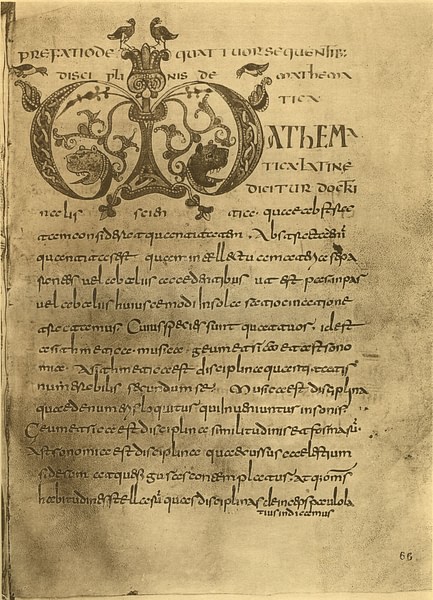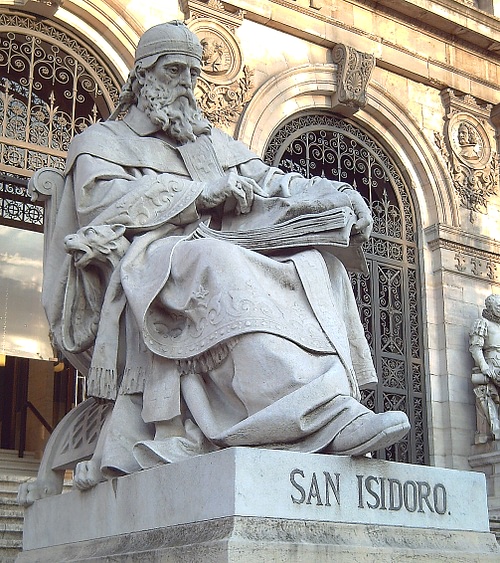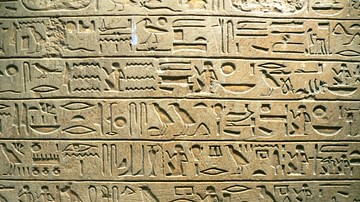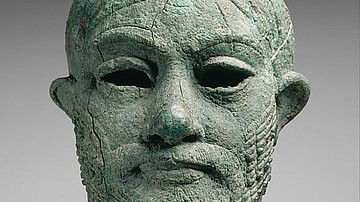
The Etymologiae (Etymologies) is a Latin work by Isidore of Seville (l. c. 560 - 636 CE), compiled in the early 7th century CE and published in its final form shortly after his death. The book is a type of medieval encyclopedia and is a survey of important knowledge and learning from the ancient world. Its content is largely derived from older Roman and early Christian texts, some of which were compilations of older material still. The Etymologiae was an extremely important book for the transmission of knowledge from the ancient world in medieval Europe. Some of the material contained in the work might otherwise have been lost, had Isidore not undertaken the monumental task of writing his encyclopedia.
The Etymologiae was copied so often by scribes and transmitted so widely that it was second only to the Bible in terms of popularity among scholars in medieval Europe. As the name suggests, etymologies play a pivotal role in Isidore's encyclopedia; there are thousands of entries on a whole range of subjects, with etymologies provided for most of them. Etymology, the study of word origins, was a very important aspect of medieval learning. To Isidore and scholars like him, the word used to describe something often contained some essence of the thing itself. For instance, wine (Latin vinum), according to Isidore, is named so because it refreshes the veins (vena) with blood. In this respect, Isidore employs etymologizing as a means of understanding the world around him, thereby encouraging his readers to do the same.
The knowledge of a word's etymology often has an indispensable usefulness for interpreting the word, for when you have seen whence a word has originated, you understand its force more quickly. Indeed, one's insight into anything is clearer when its etymology is known. (Etymologiae I.xxix.2)
Isidore of Seville
Very little is known with any certainty about Isidore himself. He was born c. 560 CE, around the time his family left Cartagena on the South East coast of Spain and moved to Seville, to escape the recent Byzantine invasion. Spain at this time was largely under the control of the Visigoths, a Germanic tribe who had settled there after generations of moving around Europe in search of a new homeland. Isidore's parents died when he was young and he was placed under the care of his brother Leander, who was the abbot of a monastery school in Seville. Leander became Bishop of Seville c. 580 CE and was a personal friend of Pope Gregory I, even before his papal coronation. Under the guidance of Leander, and Isidore after him, the Visigothic monarchy of Spain began its conversion to Catholicism. The Visigoths were originally converted to a version of Christianity called Arianism, which is a nontrinitarian doctrine, that is, they did not believe that the Father, Son, and Holy Spirit of the Trinity were coequal and coeternal. This was deemed heretical by the Catholic church.
After his brother's death, Isidore became Bishop of Seville c. 600 CE. He preserved the close ties to the Visigothic monarchy his brother had fostered and was a friend to king Sisebut (c. 565-621 CE), with whom he shared many intellectual interests. As one of the foremost bishops of his day who also had friends among the inner circle of the Visigothic monarchy, Isidore likely exerted considerable influence, both religious and political.
One thing we can be certain about Isidore is that he was an extremely prolific writer. His friend and colleague Braulio, who encouraged Isidore to write the Etymologiae, lists over a dozen major works published in his lifetime, as well as other minor works. It is a testament to Isidore's enduring popularity that all of these major works, bar one on heresies, are still extant. Isidore was very well-read, both in Christian and pagan authors, and he drew on both freely for material in the Etymologiae. Because of the breadth of his learning, Isidore has often been called “the last scholar of the ancient world”. Isidore died in 636 CE, leaving his Etymologiae unfinished. He was canonized as a saint in 1598 CE, and his feast day is 4 April.
Atoms...are said to fly through the void of the entire world in unceasing motion and to be carried here and there like the finest dust motes that may be seen pouring in through the window in the sun's rays. Some pagan philosophers have thought that all trees and plants and fruits have their origins from these particles, and that from them fire and water and the universe were born and exist. (Etymologiae XIII.ii.1)
The Structure of the Etymologiae
Isidore intended his encyclopedia as a comprehensive overview of important knowledge, however, it is not organized like a modern encyclopedia. The Etymologiae was originally organized by Isidore into 20 broad topics, which were then divided as books when the work was published after his death. The 20 books and their subjects are:
Book I - Grammar
Book II - Rhetoric and Dialectic
Book III - Mathematics, Geometry, Music, and Astronomy
Book IV - Medicine
Book V - Laws and Chronology
Book VI - Books and Ecclesiastical Offices
Book VII - God, Angels, and the Saints
Book VIII - The Church and Heretical Sects
Book IX - Languages and Nations; Civic, Royal and Military Terminology; Family Relationships
Book X - Vocabulary
Book XI - The Human Being and Portents
Book XII - Animals
Book XIII - The Cosmos and Its Parts
Book XIV - The Earth and Its Parts
Book XV - Buildings and Fields
Book XVI - Stones and Metals
Book XVII - Rural Matters
Book XVIII - War and Games
Book XIX - Ships, Building, and Clothing
Book XX - Provisions and Various Implements

Books I to III are devoted to the 'seven liberal arts' of classical education: grammar, rhetoric, and dialectic (called the Trivium), and mathematics, geometry, music, and astronomy (called the Quadrivium). These disciplines formed the backbone of any serious medieval education, hence their prime position at the opening of the Etymologiae. Book X on vocabulary is the only book in the encyclopedia organized alphabetically and while etymologies are discussed nearly throughout the encyclopedia, Book X is dedicated to them. Isidore's etymologies are sometimes accurate, other times less so, and occasionally they are outlandish. For instance, from Book X we learn that the word for master (Latin dominus) is a derivation of the word for the house (domus) of which he is in charge. Isidore is almost certainly correct here. Elsewhere though, Isidore tells us that our eye sockets (genae) are formed in the womb by our knees (genua) pressing into our face, hence their name. While these Latin words are indeed similar, this etymology is quite fanciful.
A typical entry from Isidore's Etymologiae on the origin of the Trojans:
The Trojan nation was formerly named the Dardanian, from Dardanus. The brothers Dardanus and Jasius emigrated from Greece, and Jasius came to Thrace, Dardanus to Phrygia, where he was the first ruler. After him succeeded his son Ericthonius, and then his grandson Tros, from whom the Trojans were named. (IX.ii.67)
Isidore's Sources
Isidore's main source of authority was the Bible, which he quotes from almost 200 times in the Etymologiae. Virgil is also cited more than 190 times throughout the work. Virgil (70-19 BCE) was considered the greatest poet in Roman literature and was, therefore, one of the highest authorities on the Latin language. Other pagan Roman figures such as Cicero (106-43 BCE) and Lucan (39-65 CE) are cited extensively throughout the encyclopedia, as are Christian authors, such as Jerome (c. 347-420 CE) and Augustine (354-430 CE). The bulk of material for the Etymologiae, however, is taken from other encyclopedists and compilers: Pliny the Elder (c. 23-79 CE), Solinus (c. mid-3rd century CE), Servius (late 4th century CE - early 5th century CE) and Cassiodorus (c. 485 - c. 585 CE). Isidore mostly does not cite these sources, even when quoting from them at length. Solinus, Servius, and Cassiodorus are not named once in the Etymologiae, and Pliny is named as a source only a handful of times.
On the other hand, Isidore names Aristotle (384-322 BCE) as a source more than a dozen times, even though he likely had never read Aristotle but borrowed the references from other works. Isidore even mentions Pythagoras (c. 571 - c. 497 BCE) as a source, despite the fact that Pythagoras himself left no writings. Authors such as Jerome, Aristotle, Cicero, Virgil, and the others cited by Isidore can be seen as lending auctoritas (meaning authority, but also prestige and credibility) to his encyclopedia. The Etymologiae is thus a patchwork of sources, often overlapping, sometimes cited, and other times not; often it was a second-hand reference, other times it was from his own memory. Nevertheless, Isidore moves freely from one source to another, whether pagan or Christian. This use of pagan authors alongside Christian sources was not seen as blasphemous by the medieval Church, rather Isidore was following Church Fathers such as Jerome and Augustine, who felt that a liberal arts education which included pagan authors could be a benefit to theological studies.
Legacy
The Etymologiae was an extremely influential book for over a thousand years. Its influence spread first from Spain to Gaul and Ireland and then to the rest of the continent. The famous scholar Bede (c. 673-735 CE) was very familiar with the work. The Etymologiae thrived in the cultural program of the Carolingians in the 8th and 9th centuries CE. It was copied in huge numbers across Europe and over a thousand manuscripts survive. The encyclopedia was also one of the very early printed works of medieval literature, first being printed in 1472 CE. It was a direct influence on the voluminous encyclopedias and lexicons of the later Middle Ages, and Isidore was regarded as a high authority through this time.
Geoffrey Chaucer (c. 1343-1400 CE) was familiar with the Etymologiae and quotes it at second-hand in the 'Parson's Tale' of his Canterbury Tales. Due to his fame and reverence, Dante (c. 1265-1321 CE) afforded Isidore a place within the circle of the sun in Paradise in his Divine Comedy, a realm reserved for those who had lit up the world with their intellect. More recently Ernst Robert Curtius in his study of European Latin literature noted that the Etymologiae “served the entire Middle Ages as a basic book” (23). Pope John Paul II (in office 1978-2005 CE) even nominated Isidore as the patron saint of the internet because he attempted to record everything worth knowing in his encyclopedia.








